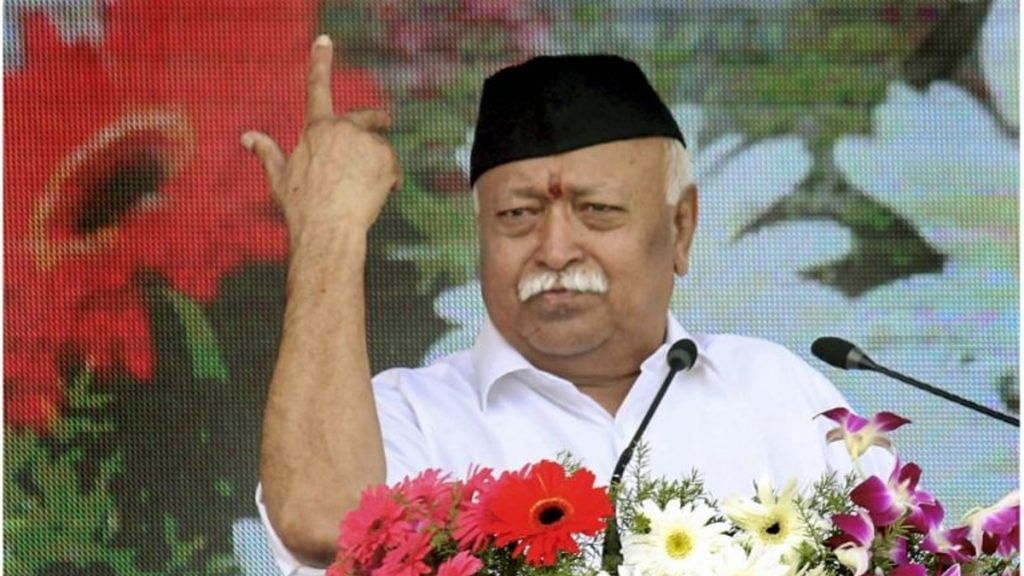The Citizenship Amendment Act is being opposed on two grounds. First, that the notion of religion-based citizenship goes against the basic premise of India’s secular Constitution. Second, that the Sangh Parivar wants to use this Act to convert India into a de facto Hindu Rashtra. But the opponents of the CAA disregard the changing ideological position of Hindutva.
It is true that the Citizenship Amendment Act (CAA) goes against the principle of constitutional secularism envisaged by the framers of the Constitution. But what the protesters have missed is that the CAA emerged out of a new, refined Hindutva ideology, which had already recognised citizenship as a political issue, even before the Citizenship Amendment Bill (CAB) was introduced in Parliament.
A new Hindutva
The RSS and the BJP (or its earlier avatar Bharatiya Jana Sangh) were not very comfortable with the term Hindutva to describe their political ideology before the Ayodhya issue. Hindutva was always associated with Savarkar and Hindu Mahasabha. It was only after the judgment of the Supreme Court in 1997 that the BJP formally accepted Hindutva as its philosophy.
These ideological ambiguities were finally ironed out by Bhagwat in 2018. Describing the RSS as an open, flexible and change-oriented network, he offered new meanings to the term Hindutva and even went on to reject some of the formulations of Golwalkar.
Also read: India under Modi is 5th biggest geopolitical risk in 2020, says consultancy firm Eurasia
Hindutva citizenship
Bhagwat does not make any direct comment on citizenship in formal sense. Instead, he lays out a few core values of Hindutva.
…According to us, Hindutva has three basics: patriotism, glory of our ancestors, and respect for culture… The collective notion of values belonging to the religions (sampraday) that are sprung from the entirety, that is India, is known as Hindutva. … This is the mark of India. And, India belongs to that.
Bhagwat then went on to refine the punyabhumi (pious land) argument of Savarkar. He invokes the distinction between Indian origin of a few religions as originally Indian to describe Islam and Christianity as alien religions. However, unlike Savarkar, Bhagwat is kind towards Muslims. He claimed that there would be no Hindutva without Muslims.
He seems to suggest that Muslims enjoy political equality in India despite the fact that their religion did not originate here.
This Hindutva ‘generosity’ argument can be found in the RSS’ 2013 resolution, which called upon the Indian government to provide citizenship to ‘prosecuted Hindu, Sikh and Buddhist minorities’ of Pakistan and Bangladesh. It said:
The government can’t shy away stating that it is an internal matter of the respective governments… In Bharat every Constitutional measure was invoked to accord not only protection and security but also many special provisions amounting to appeasement in favour of the so-called minorities. They are well-placed in our country today in terms of their demographic, economic, educational and social status…the Hindus of Bangladesh and Pakistan have been subjected to continuous persecution.
This new Hindutva conceptualisation of core Indian values, original religions/communities, and its imagination of persecuted minorities under Muslim rule appear to be the ideological sources that the CAA legalises.
Also read: Dear pro-CAA Indian-origin protesters, you feed off US secularism but support Hindu Rashtra
Constitutional state of Hindutva nation
In order to justify this revised version of Hindutva, Bhagwat makes a crucial distinction between the state and the nation. He rejects the western idea of nation-state because it empowers the political entity (state) over the cultural identity (nation).
Bhagwat has argued that the RSS is not interested in changing the constitutional structure of India. Instead, he has emphasised upon the need to evolve a national consensus in favour of his interpretation of Hindutva.
According to Bhagwat, B.R. Ambedkar reminded the Constituent Assembly that internal conflicts among Indians were the main reason behind our political slavery; therefore, we must unite as a nation.
This invocation of national unity through legal means, Bhagwat suggests, was the national consensus of that time.
But there is another function of the Constitution. Bhagawat envisages the Constitution as a tool to achieve a new national consensus, which could be modified, amended, and even revised from the Hindutva point of view through a legal process.
This new Hindutva-driven ‘national consensus’ actually points towards a new package of Hindutva politics. The Ayodhya conflict, Article 370, and triple talaq/Uniform Civil Code are more or less settled issues. It is not possible for the RSS/BJP to rely on them for mobilisation politics.
The CAA, however, is the first systematic intervention introduced strategically to challenge the BJP’s opponents who still think that this Constitution would soon be replaced.
No, Hindutva does not want a Hindu state; instead, it wants a constitutional state of Hindutva nation.
The author is a Fellow at the Nantes Institute of Advanced Studies, France (2019-2020) and Associate Professor, CSDS, New Delhi. Views are personal.
